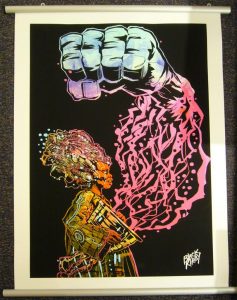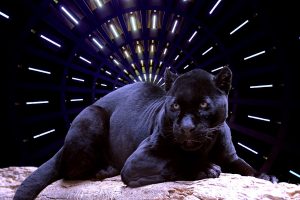
Science fiction and fantasy continue evolving. A rich and massive current wave is Afrofuturism.
Books
Afrofuturism — Africans have been writing science fiction since around the 1920s. Some of the newer voices in Afrofuturism are N.K. Jemisin , Nnedi Okorafor, Lesley Nneka Arimah, and Deji Bryce Olukoton.
These authors’ titles include:
- Jemisin’s The Broken Earth trilogy (The Fifth Season, The Obelisk Gate, and The Stone Sky) — Congratulations to The Stone Sky for winning the 2018 Hugo Award for Best Novel (making history as the first author ever to win three consecutive “best novel” awards)
- Okorafor’s Binti series (Binti, Binti: Home, and Binti: The Night Masquerade) — Congratulations to Binti: Home for being a nominee for the 2018 Hugo Award for Best Novella, and to Akata Warrior for being the winner of the Hugo for Best Young Adult Book
- Arimah’s stunning story, What It Means When a Man Falls From the Sky (listen to it now being read by Levar Burton; his podcast is excellent)
- Olukoton’s After the Flare, the follow-up to Nigerians in Space, his debut novel (here’s what he says about meeting someone he thought he had made up for the book)
- Tomi Adeyemi‘s Children of Blood and Bone, a YA fantasy that includes West African mythology, about three young people who are trying to restore magic to the kingdom. There is an excellent review of it in The Atlantic. (It will be a trilogy. It will also be a movie.)
Your library has print and ebooks about Afrofuturism, and there’s even a Fall 2018 class entitled Philosophy of Afrofuturism, taught by Professor Lebron.
Movies — Even though you saw Black Panther more than once (like I did), you may have missed The Hub’s report about Professor N.D.B. Connolly’s article in the Hollywood Reporter:
“But dreams of a place like Wakanda began sometime around 1512 in the Caribbean mountains and forested hills above the mines and fields of Spain’s colony, Santo Domingo. Then and there, Africans in the Americas first broke away from slavery to form their own societies with indigenous island people. …In villages, town and cities, too, beyond the  reach of slave-catchers in the eventual United States, black people carved out spaces and hoped-for futures of their own. Slavery and variations of colonialism, in the U.S. and abroad, forced linguistically and culturally disparate people, again and again, to understand themselves as “black,” as a race. …From Colombia to Canada to, later, coastal Liberia, a black homeland became the stuff of dreams.”
reach of slave-catchers in the eventual United States, black people carved out spaces and hoped-for futures of their own. Slavery and variations of colonialism, in the U.S. and abroad, forced linguistically and culturally disparate people, again and again, to understand themselves as “black,” as a race. …From Colombia to Canada to, later, coastal Liberia, a black homeland became the stuff of dreams.”
Finally, 2018 saw seismic changes to our sci fi / fantasy worlds:
Harlan Ellison (aged 84) left us; an irascible genius (remember the episode of Babylon 5 in which he voices a computer so incredibly annoying that the security guy shoots it? Harlan wasn’t acting.) Don’t miss the latest biography about him, and the library also has some books, movies, and stories by and about him.
Finally: let us have a moment of silence for the immortal Ursula Le Guin, who left us in January at the age of 88.
She wrote in many kinds of forms — books, novellas, short stories, poems. She disliked being pigeonholed into any genre, including science fiction; she also loathed the television version of The Wizard of Earthsea, and wrote an article entitled A Whitewashed Earthsea: how the Syfy channel wrecked my books. NEWS: A documentary about Le Guin, which took 10 years to make, will be shown in the U.S. this Fall.
References and Citations:
- Above image credit: Artist: John Jennings and Stacey Robinson, Gender: Male. (printed 2014). Black Kirby. [Object: Posters, Medium: Inkjet print on paper]. Retrieved from Artstor,courtesy of Bucknell University’s Samek Art Museum.
- Samek Art Museum website
